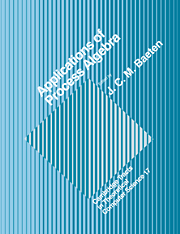Book contents
- Frontmatter
- Preface
- Contents
- An introduction to process algebra
- Two simple protocols
- Proving mutual exclusion with process algebra
- Process algebra as a tool for the specification and verification of CIM-architectures
- A process creation mechanism in process algebra
- Correctness proofs for systolic algorithms: palindromes and sorting
- Verification of an algorithm for log-time sorting by square comparison
- On the Amoeba protocol
- Process algebra semantics of POOL
- Some observations on redundancy in a context
- A modular approach to protocol verification using process algebra
- Index of concepts
- Index of names
- Index of symbols and notation
A process creation mechanism in process algebra
Published online by Cambridge University Press: 03 December 2009
- Frontmatter
- Preface
- Contents
- An introduction to process algebra
- Two simple protocols
- Proving mutual exclusion with process algebra
- Process algebra as a tool for the specification and verification of CIM-architectures
- A process creation mechanism in process algebra
- Correctness proofs for systolic algorithms: palindromes and sorting
- Verification of an algorithm for log-time sorting by square comparison
- On the Amoeba protocol
- Process algebra semantics of POOL
- Some observations on redundancy in a context
- A modular approach to protocol verification using process algebra
- Index of concepts
- Index of names
- Index of symbols and notation
Summary
We introduce an encapsulation operator Eφ that provides process algebra with a process creation mechanism. Several simple examples are considered. It is shown that Eφ does not extend the defining power of the system ‘ACP with guarded recursion’.
INTRODUCTION
Extension of process algebra
In this paper we extend process algebra with a new operator that will be helpful to describe process creation. From a methodological point of view the extension of process algebra with new operators is just the right way to incorporate new features. Only in a very rich calculus with many operators one may hope to be able to perform significant algebraic calculations on systems. In many cases a new feature requires new (additional) syntax and more equations, only in very rare circumstances the addition of equations alone suffices to obtain an appropriate model of some new system aspect. The core system ACP, see, describes asynchronous cooperation with synchronous communication.
On top of ACP various features can be added, for instance: asynchronous communication, cooperation in the presence of shared data, broadcasting, interrupts. This note adds process creation to the features that are compatible with process algebra.
For historical remarks and relations with previous literature we refer to.
Process creation
We start on basis of the axiom system ACP which is supposed to be known to the reader. We assume the presence of a finite set of data D and introduce for each d∈D an action cr(d). The action cr(d) stands for: create a process on basis of initial information d. Let cr(D) denote the set {cr(d)|d∈D}.
- Type
- Chapter
- Information
- Applications of Process Algebra , pp. 81 - 88Publisher: Cambridge University PressPrint publication year: 1990
- 4
- Cited by

